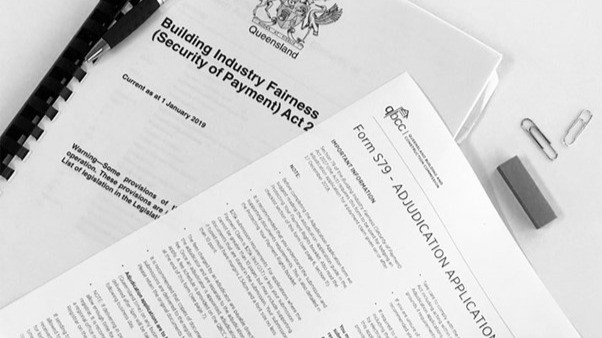
In this final week we look at the decision of Chevron Park Pty Ltd v Groupline Constructions Pty Ltd[1], which emphasises the meaning of section 88 of the Building Industry Fairness (Security of Payment) Act 2017 (Qld) (the Act), which is that the role of an adjudicator is to assess the payment claim and payment schedule that are the subject of the adjudication; it is not their role to conduct a reconciliation of the amounts actually paid at the time of the payment schedule to determine the adjudicated amount.
1. Facts
Chevron Park Pty Ltd (Chevron) engaged Groupline Constructions Pty Ltd (Groupline) to construct a residential building. Groupline submitted a payment claim for ~$2.95 million (PC19). In response, Chevron issued a payment schedule for payment of ~$900,000.
Groupline applied for adjudication, and the adjudicator determined the amount payable by Chevron to be ~$1.4million.
Chevron applied for judicial review of the adjudication, arguing that the adjudicator failed to take into account:
(a) ‘past payments’ preceding the date of PC19 which it contends were in reduction of the amount claimed in PC19; and
(b) ‘subsequent payments’ Chevron made to Groupline post-dating PC19.
The key issue was whether under s 88 of the Act, the adjudicator is required to take into account part payments (past and subsequent) made during a contract when determining the adjudicated amount.
2. Argument before the Court
Chevron argued that an adjudicators’ role:
(a) Involves a determination of how much of the amount claimed is remaining to be paid at the date of the decision; and
(b) Is to determine the balance “to be paid” after reconciling the accounts and deducting the payments already made.
This approach arises out of the construction of the words “to be paid” in section 88(1)(a) of the Act. Chevron argued the adjudication decision should be set aside for three reasons:
(a) The adjudicator ignored submissions about payments made before and after PC19 (consideration ground);
(b) The adjudicator denied procedural fairness by:
i. not seeking submissions on a jurisdictional point,
ii. not asking for submissions on new reasons, and
iii. failing to determine the correct payment amount and provide sufficient reasons (natural justice ground); and
(c) The adjudicator did not provide adequate reasons (reasons ground), which overlaps with (b)(iii).
Chevron attempted to rely upon the decision in Livingstone Shire Council v EarthTEC Pty Ltd[2] where the court held a payment claim was partially offset by payments made into court due to subcontractor charges and agreed that the adjudicator should have considered such payments in the adjudicated amount to avoid forcing the respondent to pay money that wasn’t owed.
3. BIF Act
Section 88 of the Act relevantly provides:

4. Decision
The Court dismissed the application and held that the adjudicator was not required to consider past and subsequent payments and reconcile them against the amount claimed for the following reasons:
(a) Under s 88(1)(a) of the Act, the adjudicator must decide ‘the amount’ of the progress payment (the adjudicated amount). This amount is linked to the payment claim and payment schedule which responds to the payment claim, and pursuant to s 68 of the Act, expressly relates to the identified ‘construction work’ as a defined term. The adjudication is therefore in respect of the work which has been done or is claimed to be done under the relevant payment claim;
(b) Because payments are progressive there is sometimes an overlap between payment claims, however, payments cannot be offset in some way against new work claimed in the payment claim in question;
(c) Chevrons interpretation of s 88(1)(a) is incorrect, as it suggests the adjudicator must determine how much of the claim “remains to be paid at the date of the decision”, however, no such words appear in that section of the Act;
(d) Section 88 of the Act does not require the adjudicator to consider events after the ‘reference date’, even if they formed part of submissions in the adjudication;
(e) Pursuant to s 88(3), the adjudicator is not entitled to consider ‘new reasons’ for withholding payment that were not in the payment schedule, therefore, in circumstances where the subsequent payments were not made until February 2024 (after the payment schedule was issued) there is no way Chevron could have adduced that evidence; and
(f) Furthermore, the adjudicator acknowledged there was a dispute regarding amounts which had been paid, however, declined to reconcile them and concluded that it was a matter for the parties to verify and reconcile the accounting records, therefore, the adjudicator can’t be said to have failed to consider past payments.
The Court also held that the decision of Livingstone was distinguishable as the adjudicator did not consider submissions about the contractor charges, which was deemed a mistake. In contrast here, the adjudicator didconsider the submissions but rejected them. Additionally, Livingstone was considered in light of the Payments Act 2004, at which time there was no equivalent s 88(3) in that act, therefore, the Court did not have to consider the issue of ‘new reasons’.
Whilst not covered in this article, the Court also went onto to reject Chevron’s natural justice ground and the reasons ground and ultimately dismissed the application.
Legal Support
At Lamont Project and Construction Lawyers, we bring extensive experience to all phases of a project – from development and contract negotiation to dispute resolution and practical completion.
Our tailored approach ensures that clients are optimally positioned for success, no matter the circumstances they face.
If you have questions about your current or future projects, please feel free to reach out to us. We would be happy to discuss how we can assist you.
Contact: Peter Lamont or Stephanie Purser
Email: [email protected] or [email protected]
Phone: (07) 3248 8500
Address: Suite 2, Level 2 349 Coronation Drive, Milton Qld 4064
Postal Address: PO Box 1133, Milton Qld 4064
[1] [2024] QSC 202;
[2] [2018] QSC 271 at [29].
